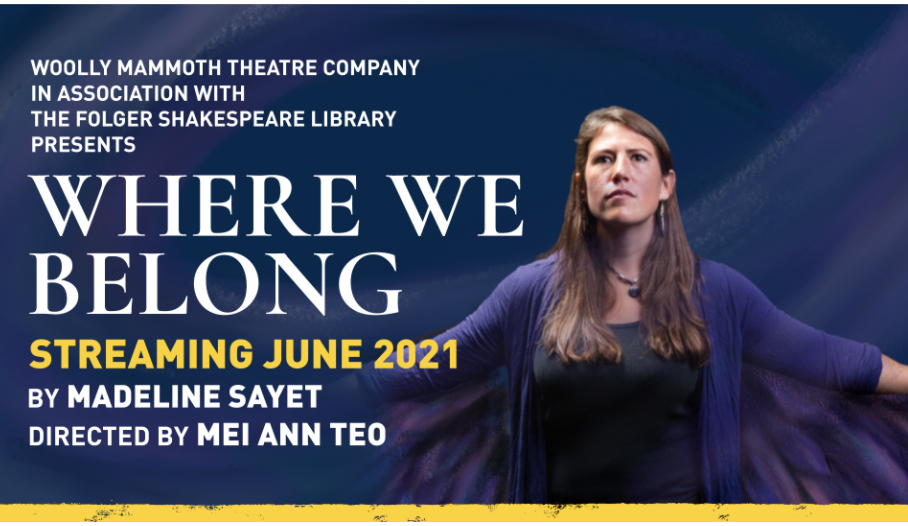One truth of these late-Covid days, around 18 months since the arrival of the pandemic to American shores, is that I’m really looking forward to the return of live theater. But in the meantime I loved streaming this one-woman show by Mohegan playwright and performer Madeline Sayet. And I did catch a snippet of her speaking live, in conversation on the New Haven Green, courtesy of the International Festival of Arts & Ideas, my local favorite Arts festival that is soldiering on through partial quarentine conditions.

Her autobiographical play, Where We Belong, carries Sayet from her roots in Eastern Connecticut as the daughter of Mohegans to England where, as she explains a few different times to UK customs officials at the border, she travels to study the works of William Shakespeare. The play explores the tensions between Sayet’s Mohegan identity and Shakespeare’s imperial reach. In conversation last night, she said the play combines three stories:
- Her own journey from wolf (which is what the word mohegan means) to bird (which is what her own Mohegan names means)
- The intellectual and spiritual journey of an Indigenous woman to England, the home of the colonizers who decimated her people during First Contact, which was not incidentally close in time to Shakespeare’s own day.
- The relationship between Shakespeare’s plays and colonialism/imperialism, which was the subject of her academic work in England
To me, the most compelling moments came in her lyrical meditations on flight and identity, the way repeated air travel loosened her felt connection with the earth of her people, at least temporarily, and the way Shakespeare studies, in its self-conscious efforts to become “global,” amounts to a view from the stratosphere that fails to know the land.

Her observation, repeated in last night’s public talk in New Haven, that Shakespeare’s writing, now cherished by so many people all around the world, was composed when the Mohegan people “still had all our words” was striking and powerful. The loss of native speakers of Mohegan and many other Indigenous languages is one of many horrors of conquest and settler colonialism, and it’s compelling to emphasize the contrast between words an English playwright invented and the words that a Native American people lost.
The Shakespearean refrain of her performance comes from Caliban: “You taught me language, and my profit on’t / Is, I know how to curse” (Tempest 1.2). My sense is that she has backed slightly off of her early claim that Shakespeare is an “anti-colonial” artist — I agree with her that the truth is more ambiguous, though certainly there can be and are many anti-colonial responses to Shakespeare — but she does an excellent job show how the poet’s language raises and complicates questions of identity and geography.
Since like Sayet, I own The Tempest as my “favorite play,” despite its patriarchal and imperialist baggage, I couldn’t help but think about the difference between quick airborne connections between North America and England, like those made by Sayet in the play and by me during non-pandemic years, and the longer and more uncertain sea voyages made by the Mohegan ambassadors whose grave markers she visited in Southwark and the colonizers who arrived in North America from Europe in the early modern period. What has the shift from sea travel as the primary driver of early modern “wet globalization” to the faster and less environmentally-connected practice of airline flights done to human geographical experience? Have airplanes broken something?
That’s a question I’ll keep puzzling, including through engaging with past and future work by Madeline Sayet!
Enjoy the live-stream of the play, which is available through July 11!